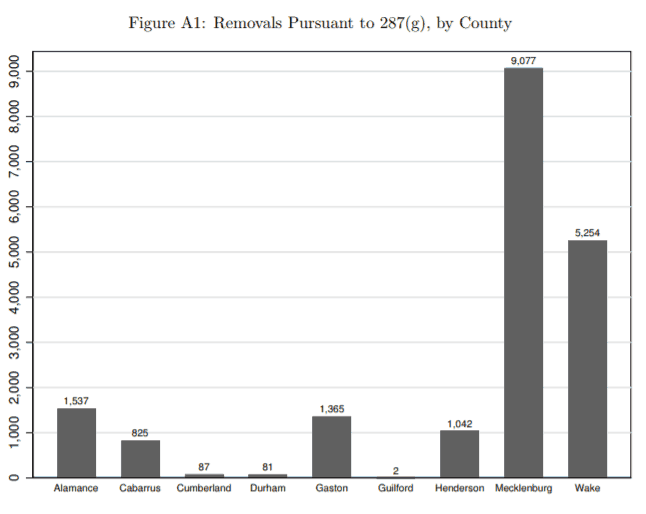For Your Consideration
In a new working paper, researchers at the Cato Institute look at the effect of allowing local law enforcement to enforce federal immigration laws in North Carolina through a program called 287(g). They find no relationship between crime rates and implementation of the 287(g) program, which allows state and local law enforcement to investigate, apprehend, and detain illegal immigrants after receiving training from the Department of Homeland Security. However, they do find an increase in police assaults, suggesting communities became less trusting and more aggressive to local police after they began apprehending and deporting illegal immigrants.
Alamance, Cabarrus, Cumberland, Durham, Gaston, Guilford, Henderson, Mecklenburg and Wake all implemented the 287(g) program. The following graph shows deportations by county from 2003 to 2013.

Dropping Knowledge
Researchers at the Samuel DuBois Cook Center on Social Equity and Insight Center for Community Economic Development at Duke University published a new report this week titled, “What We Get Wrong About Closing the Racial Wealth Gap.” In it, they argue that many popular solutions to closing the racial wealth gap, such as greater educational attainment, harder work, or better financial decisions, only perpetuate the idea that it is dysfunctional behavior rather than structural inequalities that cause the wealth gap and will not make an impact on closing the gap. Instead, they argue that large, structural changes are necessary to reduce the racial wealth gap:
“There are no actions that black Americans can take unilaterally that will have much of an effect on reducing the racial wealth gap. For the gap to be closed, America must undergo a vast social transformation produced by the adoption of bold national policies, policies that will forge a way forward by addressing, finally, the long-standing consequences of slavery, the Jim Crow years that followed, and ongoing racism and discrimination that exist in our society today.”
Need to Know
The North Carolina Early Childhood Foundation is hosting a webinar next Wednesday on transforming the financing of early care and education. Find out more information and register here.
Reach NC Voices is powering a survey for the myFutureNC Commission to ask North Carolinians about strengthening educational and economic opportunities in their communities. Take the survey here, and then head over to our AskNC page to ask us your questions about North Carolina politics, policy, and government.
What we're reading
Using Virtual Reality to Plot Urban Green Spaces
City dwellers tend to seek out green spaces, but can dense vegetation impact a person's feeling of safety? It depends whether the vegetation is downtown or in a park, according to a recent study by NC State researchers. ... Read the rest-
When Disadvantaged Students Overlook Elite Colleges
-
An Rx for poverty? A career in nursing
-
Austin is piloting blockchain to improve homeless services
-
Your next pilot could be drone software
-
The EU Is Trying to Decide Whether to Grant Robots Personhood
-
Would Americans Accept Putting Health Care on a Budget?


